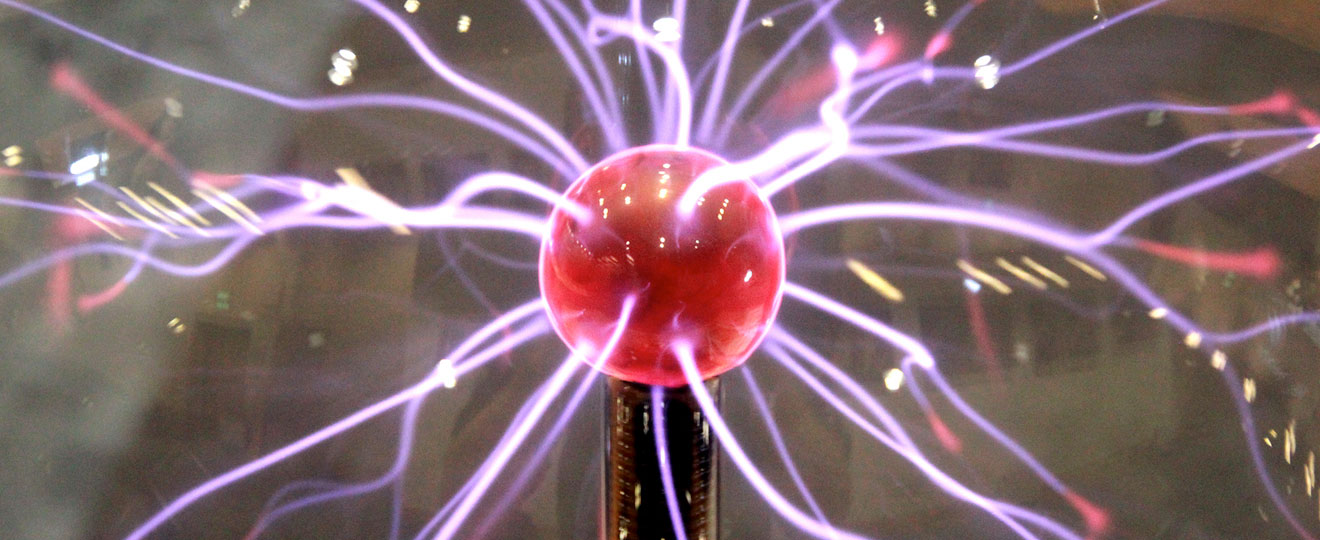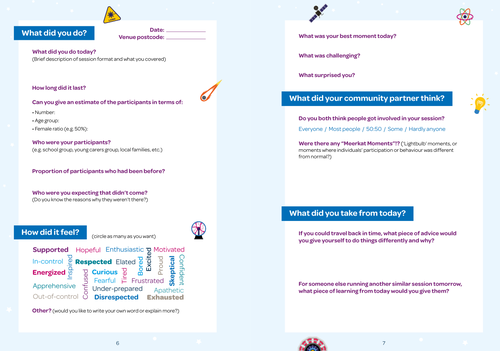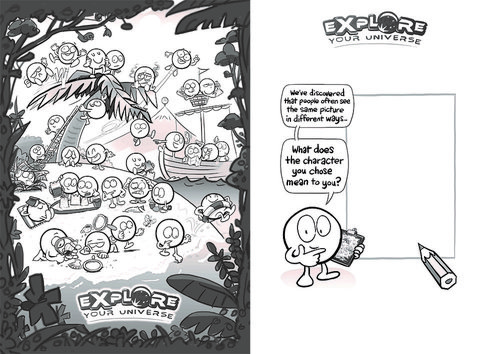- Who's Behind EYU
- Contact
- Search

The evaluation of EYU4 is structured and focussed on 16 key impacts (listed below) considered of most importance to measure, focussing on change taking place for participants, practitioners and Science Centres as a whole taking place through participation in EYU4.
1) The number and length of the multiple interactions.
2) The number of children taking part in sessions.
3) An indication of the retention of participants (e.g. what percentage came to all sessions?).
4) Data related to the gender of participants.
5) Ages of children (with a target of children aged 8 – 14) taking part in sessions.
6) The number of adults attending sessions.
7) Data related to the IMD of the community group participants.
8) Do participants feel a connection to science, that science is something relevant to them?
9) Has there been a change for them, that has taken place due to participation in Explore Your Universe Phase 4?
10) Do participants feel inspired and involved by the sessions? Did they feel enabled to take part and did they feel like they belong?
11) What is their ‘take home’ from the sessions? What aspects would they like to remember or share with others?
12) An indication of adult science capital for parents/carers/wider families attending sessions.
13) An indication of the progression of the partnership between Science Centre & community organisation.
14) The activities and approaches that were utilised and changes made during the programme.
15) Who was involved in the development and delivery of the activities?
16) Where this programme has catalysed more embedded changes within Science Centres.
This programme aims to avoid lengthy and excessive data collection through standard evaluation forms and diversity checklists for participants. We believe this to be inappropriate when we consider the needs and vulnerabilities of the groups and the importance of the relationships between Science Centres and the groups they are working with. A variety of flexible methods, including written and pictorial forms, observations and interviews are utilised within the programme to seek to understand the impact we have. In some cases these are co-developed between the Science Centres and Community Partners to ensure they are suitable.
Explore Your Universe Phase 4 developed, designed, piloted and finalised a series of tools to support Science Centres to collect meaningful data for the Explore Your Universe Programme. Rachael Inglis (Cambridge Science Centre), Sefton Park Primary School and Walton Youth Project were involved in the piloting of participant tools.
Participant tools are also available in Welsh, Latvian, Polish and Russian. Please contact the Project Manager to request translations.
The Inclusion Wheel provides an accessible tool to guide strategic discussion for all science centre practitioners to enable organisation-wide reflection. This tool addresses elements of inclusion across different areas of an organisation including; leadership & strategy, evaluation, content, partnerships, staff diversity training and accessibility.
In 2020, all science centres will be encouraged to use the Inclusion Wheel to support discussions during a cross-department/cross-level reflection meeting within their organisations (likely Spring 2020).

The Reflection Journals gather important metrics/demographic data avoiding intrusive and frequent polling / questionnaires of the participants. Data gathered will inform the learning of what worked well, what was challenging, and what changed throughout the programmes of work. This journal provides a formal mechanism to enable science centre and Community Partner practitioners to engage in reflective practice together, and allows the learning from activities and approaches to be shared with wider science engagement professionals.
All science centre practitioners must complete this journal after every interaction with families and are encouraged to fill in the journal after initial Community Partner meetings.
Download the Reflection Journal
A fun tool to provide an illustration of the ups and downs of partnership and trust building. EYU4 aims to promote equitable partnerships, however, we anticipate that an honest picture will show how organisations take leading roles at different times in the partnership in order to move programmes forward depending on internal or external pressures. Interesting outcomes may be evident in different partners viewing the same relationships from different perspectives and opening up opportunities for conversations about less equitable partnership pairs.
Download the Partnership Tracker cards
The Passport indicates the retention of participants (e.g. a method to measure how many came to all sessions, how many attended a percentage of sessions, whether particularly sessions were very popular etc.). This tool also provides an indication of the ‘take home’ from sessions – i.e. what aspects do participants remember and want to share with others.
Download the Participant Passport

The colour-in mood characters are an engaging and fun way for participants to consider and express their emotions and involvement in sessions. This chart explores whether participants felt inspired, excited, or bored, left out, included or out-of-depth.
On the second page (which we recommend printing on the back of the first page) participants write how they interpreted the character they coloured in. This supports with building an understanding of how people see these characters to support the use of this tool for future data collection.
Download the Colour-in Mood Character sheet
A simple tool to understand whether participants feel a connection to science, whether they feel that science is something ‘for them’. By completing the ‘What does ‘science’ mean to you?’ we aim to understand whether it is this reframing of the relevance of what ‘science’ is that will link to a greater connection to science for participants. This tool, when used at the start and end of the series of interactions will provide understanding of whether a change has taken place during participation in Explore Your Universe Phase 4.
Download the Connection to Science tool
Tools to gather metrics/demographic data (ages, gender, postcode data) from participants as well as information about future aspirations and elements that link with science capital.
Download the Science Capital form for adults
Download the Science Capital form for children